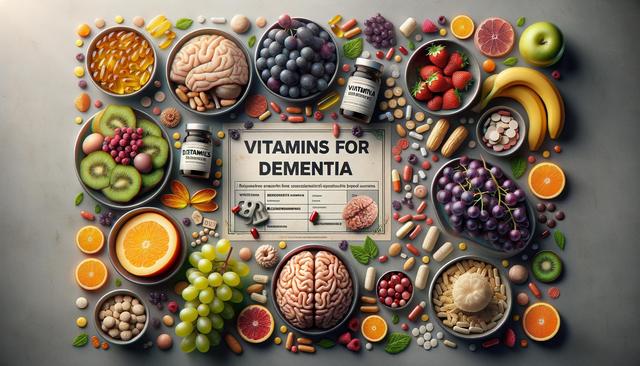Understanding the Link Between Nutrition and Cognitive Decline
As we age, cognitive function can gradually decline, sometimes leading to conditions like dementia. While no supplement can cure or completely prevent dementia, research suggests that certain vitamins may support brain health and potentially reduce the risk of cognitive impairment. A diet rich in nutrients, combined with targeted vitamin supplementation, may help maintain mental clarity and slow down memory loss. This holistic approach is especially important as the brain requires a variety of vitamins and minerals to function properly.
Some individuals may not get enough of these nutrients from food alone due to dietary restrictions, health conditions, or age-related absorption issues. In such cases, taking vitamins for dementia may offer additional support. Still, it is essential to consult a healthcare provider before beginning any supplementation, especially when managing a condition like dementia. The goal is not to replace medical treatment but to complement it with nutritional support that may help improve overall well-being.
Vitamin B Complex: Supporting Brain Energy and Memory
The B vitamin group, including B6, B9 (folate), and B12, plays a significant role in brain function. These vitamins help reduce levels of homocysteine, an amino acid linked to brain shrinkage and cognitive decline when elevated. Vitamin B12, in particular, is crucial for maintaining healthy nerve cells and producing neurotransmitters that affect memory and mood.
Here are some possible benefits of B vitamins for brain health:
- Support the production of brain-signaling chemicals
- Help reduce brain inflammation
- May slow cognitive decline in individuals with mild symptoms
- Assist in maintaining energy levels and reducing fatigue
A deficiency in these vitamins is not uncommon in older adults, making it important to monitor levels and consider supplementation when necessary. Including foods like leafy greens, eggs, legumes, and fortified cereals can also help meet daily needs.
Vitamin D: A Key Nutrient for Brain and Mood
Vitamin D, often called the “sunshine vitamin,” is well-known for its role in bone health, but it also plays a vital part in brain function. Low levels of vitamin D have been associated with increased risk of cognitive decline and dementia. This nutrient may support brain health by regulating calcium in the nervous system and reducing inflammation, both of which are important for cognitive performance.
Some reasons vitamin D is considered beneficial for cognitive support include:
- Potential to protect neurons from damage
- Support for mood regulation, which can affect mental clarity
- May help reduce the risk of developing dementia-related symptoms
Older adults, especially those with limited sun exposure, may benefit from a vitamin D supplement. However, it’s important to test levels first to determine the right dosage. Natural sources like fatty fish and fortified dairy products can also contribute to daily intake.
Vitamin E: Antioxidant Protection for the Brain
Vitamin E is an antioxidant that helps protect cells from oxidative stress, which is believed to contribute to the progression of dementia. Research indicates that individuals with higher levels of vitamin E may experience slower cognitive decline. This vitamin supports healthy brain function by maintaining cell membrane integrity and fighting off free radicals that can damage brain tissue.
Some foods high in vitamin E include:
- Nuts and seeds, such as almonds and sunflower seeds
- Spinach and other dark leafy greens
- Avocados and plant-based oils
While vitamin E shows promise in supporting brain health, it should be used with caution. High doses may pose risks, especially for individuals on certain medications. A healthcare provider can help determine a safe and appropriate amount based on individual needs.
Combining Vitamins with Lifestyle for Better Results
Taking vitamins for dementia is most effective when paired with healthy lifestyle habits. Nutritional support works best as part of a broader approach that includes diet, physical activity, mental stimulation, and stress management. Vitamins can help fill nutritional gaps, but they are not a substitute for a balanced lifestyle.
Some practical tips for supporting brain health include:
- Eating a Mediterranean-style diet rich in fruits, vegetables, whole grains, and healthy fats
- Staying physically active to improve blood flow to the brain
- Engaging in mentally stimulating activities like reading, puzzles, or learning new skills
- Getting adequate sleep and managing stress levels
A combination of these strategies, along with targeted supplements like vitamin B complex, vitamin D, and vitamin E, may help support long-term cognitive health. Regular check-ups and personalized medical advice remain essential for managing dementia risk or symptoms.
Conclusion: Supporting Brain Health with the Right Nutrients
For individuals concerned about cognitive decline, exploring the role of vitamins for dementia can be a valuable step. While no supplement can guarantee prevention or reversal, certain nutrients—especially B vitamins, vitamin D, and vitamin E—have shown potential in contributing to brain health. These vitamins support processes like neurotransmitter production, inflammation control, and antioxidant protection, all of which are linked to cognitive function.
When used alongside a healthy diet and lifestyle, these vitamins may help maintain mental clarity and slow the progression of symptoms in some individuals. As always, the most effective approach involves working with a healthcare provider to create a personalized plan that considers individual health needs and goals. By staying proactive and informed, it’s possible to take meaningful steps toward supporting cognitive function at any age.


